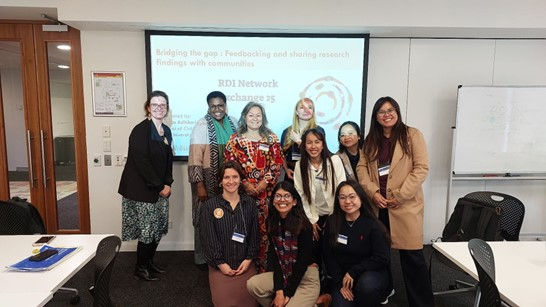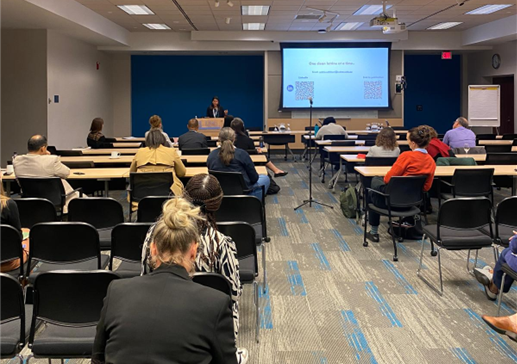The Work Within: Why Decolonizing Development Starts at Home
- Sabita Adhikari

- Sep 5
- 5 min read
This blog was co-written with FLUSH Associate Sarah Lebu.
Why introspection in the Global South is as important as external reform in decolonizing international development.
The Internalised Colonial Bias
"Congratulations, you've been shortlisted for an interview for the role of Assistant Sanitation Project Officer," said the human resources (HR) representative of an international NGO. It was my first job interview after graduating from university in Nepal in 2015. I was excited but also nervous. I learnt that the interview panel would include a "foreign expat" alongside the HR officer. I immediately began to wonder whether I would be able to impress someone I imagined to be a highly experienced, likely Western, expert.
On interview day, I was led to the interview room, where I met a man who appeared to be from Nepal. I assumed he was the HR officer and waited for the foreign expat to arrive. A few moments later, the HR officer walked in and introduced the panel: "Sabita ji, welcome. This is our WASH program manager, who recently joined our Nepal team from Bangladesh, and we will both be interviewing you today."
In that moment, I felt a wave of embarrassment. Why had I assumed that "foreign expat" meant a Western white person? Why hadn't I considered someone from our region or someone with a similar cultural background?
That moment marked one of my earliest recognitions of how deeply colonial thinking can live within us and shape our unconscious assumptions. Many of us in the Global South have, over time, internalised a set of beliefs that conflates whitness with expertise, authority, and value.. These ideas run deep - sometimes so deep we barely notice them.
When Buzzwords Are Not Enough
In recent years, the international development and global health sectors have seen a surge in buzzwords such as decolonisation, co-design, and localisation, and so on. These concepts are increasingly central in discussions at conferences, webinars, strategic meetings, and on social media platforms. At their core, these discussions call for dismantling unfair power structures and inequities, both historically and ongoing, that have long defined the aid sector and shift control, ownership, and leadership to communities in the Global South.

Yet the embrace of decolonised language can sometimes ring hollow, particularly when rhetoric is not aligned with meaningful action. While conversations about decolonisation grow louder, the voices of grassroots actors in the Global South remain largely absent from the very discourse that claims to champion them. Most critiques have rightly often focused on how Global North institutions continue to dominate decision-making, including controlling funding flows, setting research agenda,s and directing program implementation in the Global South. But what receives far less attention is the equally necessary and often uncomfortable work that must happen within individuals and institutions based in the Global South.
Leading the Way or Waiting to be Decolonized?
An article on decolonising global health observed, "We appear to be waiting passively for the rising tide of decolonisation initiatives from the Global North to lift all boats, rather than actively partnering in, or leading the process". This quote struck a chord. It reflects a broader dynamic in which decolonisation is framed as something the Global North must do for the Global South, rather than something we must also pursue within ourselves.

What if the most uncomfortable and necessary work lies with the individuals and institutions of the Global South? Even as we rightly demand recognition, autonomy, and leadership, we must also interrogate how we – consciously or not – sometimes reinforce the very hierarchies we seek to dismantle. Many of us have witnessed brilliant colleagues passed over for opportunities in the sector, not because they lacked local knowledge or technical skills, but because their English wasn't fluent enough. We have participated in, or prepared for, the elaborate rituals surrounding field visits by international consultants or donor representatives, often involving polished narratives over authenticity.
Unlearning is Our Decolonization Work
Decolonizing development in the Global North demands systemic reform. But for many of us in the Global South, it also requires unlearning, a process that is equally vital and far more personal.
Unlearning the instinct to align our voices and outputs to donor expectations.
Unlearning the belief that success must be framed in Western languages or through theories and frameworks developed in the Global North.
Unlearning the notion that local knowledge must be validated externally to be legitimate.

This process is not easy. It calls for deep reflection, uncomfortable conversations, and courage to be vulnerable. It asks us to commit to the difficult process of examining how we may have absorbed and enacted the legacies of colonialism, even as we resist them. So next time, a consultant or researcher from the Global North visits our project area, could we welcome them as we would any other visitor from our country, without the rehearsed narratives or extra pageantry? Can we trust that our realities, grassroots innovations, and community voices are enough?
Because decolonisation isn't just about shifting power structures - it is also about reclaiming authenticity. That journey doesn't begin with hashtags or international declarations. It begins within us.
Have you noticed how internalised colonial bias can quietly shape everyday life? How do you respond when those reflexes appear? Have you experienced moments that made you stop and question your long-held assumptions? These are not easy questions, and perhaps that is exactly the point. We would love to hear your reflection.
Note: While writing this piece, as researchers and practitioners from the Global South currently working within the Global North institutions, we acknowledge the privilege of our position. This reflection is not intended to blame or reinforce a deficit mindset. Rather, it is an invitation to honest dialogues and introspection – because real change begins where we have the power to act.
About the authors:
Sabita Adhikari is an Associate Lecturer in the School of Civil Engineering at The University of Sydney, Australia. Her current work focuses on providing access to safe and sustainable water, sanitation, and hygiene (WASH) services in the Asia-Pacific region. She has worked with several international and national development agencies implementing WASH programs in rural communities of Nepal.
Sarah Lebu is a postdoctoral researcher at The University of North Carolina and an associate at FLUSH. She has collaborated with governments, development agencies, and private sector partners to advance policies and programs that expand access to water and sanitation services across Sub-Saharan Africa. Her current work focuses on quantifying and mitigating the impacts of climate change on WASH services.



Comments